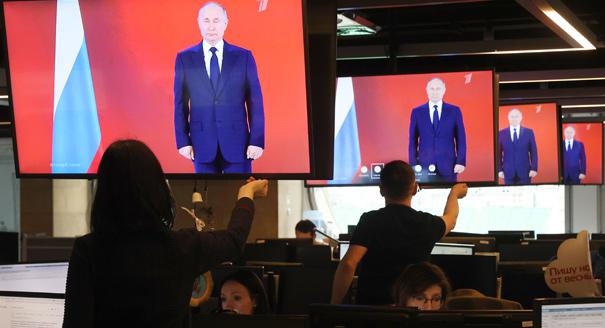On December 1, Putin gave his yearly speech to Russia’s upper house of parliament. His address depicted a Russia that was leaving a bleak period of sanctions, isolation, and economic decline for a new era in which friendly regimes in the West would facilitate a sort of Russian renaissance. It also suggested that the president, rather like a streetwise beggar who had just won the lottery, wasn’t quite sure what to do with his newfound fortune.
Just as a large jackpot might fail to calm a person’s inner turmoil, the political sea change in the West, characterized most famously by Donald Trump’s November win, does nothing to ease Putin’s internal dilemmas. The president has yet to work out what exactly his fourth term will look like after his likely reelection in 2018. Nor does he have a plan to preserve his influence after 2024 when, barring any dubious constitutional amendments, his presidency will be over for good.
If there was one thing Putin seemed sure about in his speech, it was that Russia would retain its own form of “democracy”—one characterized by a constitutional majority for ruling party United Russia, elections designed to marginalize the opposition, and a state monopoly on national history and ideology.
One superficially progressive moment came when Putin addressed the ongoing feud between Russia’s so-called liberal opposition (which ranges from neoconservatives to democratic socialists) and its self-identified “patriots” (i.e., revanchists). While the president tends to reserve his criticism for the former, this time he condemned the latter’s habitually aggressive response to liberal grievances (which tend to include calls to tone down nationalist rhetoric and rein in security services). He even urged officials to support non-governmental and volunteer organizations, many of which have suffered state repression in the past few years, and he called out his Investigative Committee for political showmanship in its anti-corruption efforts.
But while some—namely members of the security and intelligence communities—were irked by the president’s apparent permissiveness, his comments do not signal a larger role for the opposition in the months ahead. His criticism of the Investigative Committee was a nod not to liberals, but to the committee’s rivals, the Federal Security Service (FSB). The fact is that the opposition faces growing obscurity, and Putin had to scold their nationalist adversaries to maintain any semblance of balance. He was careful to state that any aggression on the part of the nationalists was “reactive,” adding that “people find unfairness and lies very upsetting.” In perhaps his frankest statement of his sympathies, he said: “If someone considers themselves more advanced, more cultured, even smarter somehow, then fine—but treat others with respect.” His message was clear: liberal critiques of state policy are anti-Russian and antisocial, and there will be limited tolerance for their public expression.
Regarding the West, Putin’s tone was more conflicted. At times, he seemed to have one foot in a dark past as he railed against rampant anti-Russian propaganda, Western media censorship, and a manhunt against Russia’s Olympic athletes. At other times, he spoke like the lottery-winning beggar who suddenly has access to high society and is unsure how he will be received. He promised to conduct himself responsibly on the world stage, help solve conflicts, avoid confrontation, and respect international laws and conventions: “We are not and never were looking for enemies,” he said, “we need friends.” Sounding rather like a 2006 version of himself—a version laid to rest after his 2007 Munich speech—he called for a return “to a serious discussion about building a sustainable system of international relations for the twenty-first century.”
Such progress, he suggested, would require that the West remove its restrictions on Russian media (such as Russia Today), refrain from anti-Kremlin rhetoric, stop talking about the country’s internal affairs (for example, human rights), and recognize Moscow’s Syria operations as legitimate. His dispute with the West over Ukraine was notably absent from these conditions, implying that Putin may expect the crisis to resolve itself once relations between Russia and the West improve.
Where domestic affairs are concerned, Putin’s speech would have been better suited for the mayor of a large city than for a head of state. Schools, hospitals, gifted children, charitable giving and volunteerism, roadworks, waste management, and yard maintenance got lots of play while salaries, the state pension system, and the fundamentals of socioeconomic policy got none. This lack of substance is unsurprising: Putin’s dialogue with the public tends to be limited to reassuring them that he is on their side, while any real governance happens behind closed doors. Perhaps more importantly, policy under Putin is always secondary to personnel, and there are likely to be significant personnel changes in the run-up to his reelection. Since the future of his cabinet is up in the air, policy is too.
Having previously called on his Economic Council to eschew “ideological preferences” in favor of a “pragmatic approach,” Putin seems to have decided that the only ideologically neutral economic plan is no plan. Now he has announced that Russia would “reach a rate of economic growth higher than the world average” by 2019–2020, but he gave no inkling of how this would be achieved. He has declined to take up plans from key advisers—the progressive Alexei Kudrin or the regressive Sergei Glaziev. Of course, having no plan means a few industry heavyweights get to shape the country’s economy: Mikhail Kovalchuk and Andrei Fursenko (science and IT), Sergei Chemezov (machine-building, military industrial complex), agricultural industry lobbyists, Putin’s childhood friend Arkady Rotenberg (Crimea Bridge), and Sergei Ivanov (waste management).
And so, Putin’s address, while long, said little. He spoke like someone biding his time before articulating any firm plans, opting to speak in placeholder generalities. On the domestic side, Putin is holding out for the launch of his reelection campaign next year. On the international front, he may be waiting to take his cues from the man on whom he has staked many of his hopes—a man whose sense of the future is at least as fuzzy as his.



